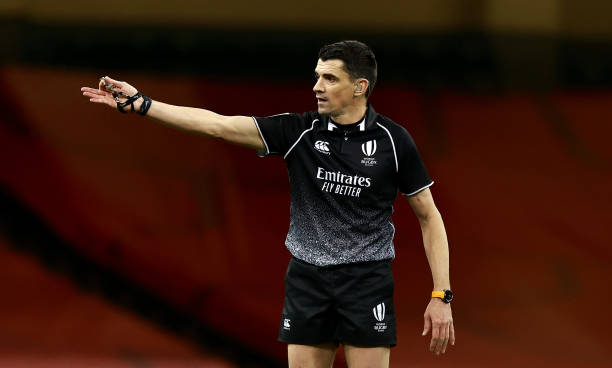French referee Pascal Gauzere will remain part of the Six Nations panel of referees despite admitting that he erred in awarding Wales two opening tries against England.
Gauzere came under fire for his performance in the Six Nations clash between Wales and England in Cardiff this past Saturday, which the home side won 40-24.
ALSO READ: France leapfrog England in rankings
This was mainly due to his decision to award Wales their two opening tries in the first half of the match. He firstly upset England captain Owen Farrell by instructing him to talk to his team about their penalty count, before allowing Dan Biggar to take a quick tap and crosskick the ball to Josh Adams to score. Wales’ second try, scored by Liam Williams, came after what appeared to be a clear knock-on by Louis Rees-Zammit.
According to the Guardian, Gauzere will no longer take touch judge duties in England’s final Six Nations match against Ireland in Dublin on 20 March. Instead, he will referee Scotland’s Test against Italy in Edinburgh as South African referee Jaco Peyper will be unable to make the trip due to ongoing Covid-19 restrictions.
Gauzere also had a debriefing session with World Rugby’s head of referees, Joël Jutge, on the morning after the Wales vs England Test. World Rugby is considering that Gauzere was at fault for the first try, but also believes that he and TMO Alex Ruiz, confused each other by discussing the second try in English, rather than French.
‘You have to realise that when you make a mistake, you have to be transparent about it,’ Jutge told French newspaper Midi-Olympique. ‘Having spoken to him on the telephone, Pascal recognises that and he remains an excellent international referee.
‘From the moment the referee says time on, the game can resume. Except that it was up to him [Gauzere] to make sure England had the necessary time to get back into place since it was he who had asked the captain to speak to his players.
‘The ball is not controlled by the wing and falls on his thigh,’ Jutge said about Wales’ second try. ‘The situation became confused because at the time there was no notion of loss of control. The reality is that if he had whistled for a knock-on, no one would have found fault with him. This is one of the perverse effects of the video system, looking too much [at an incident] in microscopic detail. There is a tendency to refer to the TMO too often when one can make the call on the pitch and stick with it.’
ALSO READ: What’s in our new issue?
Photo: David Rogers – RFU/The RFU Collection via Getty Images





